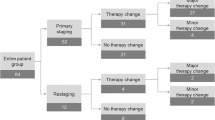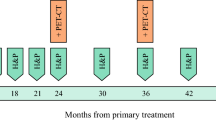Abstract
Purpose
To evaluate the influence of 18F-FDG-PET/CT on clinical decision making and outcome in advanced melanoma patients planned for radical metastasectomy.
Methods and materials
A cohort of 333 patients with mainly stage III/IV melanoma having a PET/CT for clinical reasons was prospectively enrolled in our oncologic PET/CT registry between 2013 and 2015. Referring physicians completed questionnaires regarding their intended management for each patient before and after PET/CT. Management changes after PET/CT were classified as major and minor changes. A subgroup of 107 patients (stage I, N = 5; stage II, N = 3; stage III, N = 42; stage IV, N = 57) was planned for complete metastasectomy initially, based on conventional imaging. Management changes and outcome were evaluated by linkage with the information obtained from patients’ medical records.
Results
In 28 of 107 patients (26%), the surgical treatment plan remained unchanged after PET/CT. In 24 patients (22%), minor changes were performed, such as enlargement or reduction of the surgical field. In 55 patients (51%, 95% CI 42%-61%) major changes of the intended treatment plan occurred; of those, 20 patients (19%) were classified to be tumor-free with PET/CT, 32 patients (30%) were found to have multiple previously unrecognized metastases and had to be treated by systemic therapy, three patients (3%) had to be changed to palliative radiotherapy or isolated extremity perfusion. The 1-year and 2-year overall survival (OS) in patients with complete metastasectomy (N = 52) was 90% and 79%, respectively. Systemically treated patients (N = 32) resulted in 1-year OS of 72% and 2-year OS of 61%. Eleven of 32 patients (34%) with systemic therapy experienced a complete response. Until December 2016, all 20 patients classified as tumor-free by PET/CT were alive.
Conclusion
The study confirms the high impact of PET/CT on clinical management in patients with advanced melanoma planned for radical metastasectomy. PET/CT resulted in frequent management changes, preventing futile surgery in half of the patients.


Similar content being viewed by others
References
Balch CM, Gershenwald JE, Soong SJ, Thompson JF, Atkins MB, Byrd DR, et al. Final version of 2009 AJCC melanoma staging and classification. J Clin Oncol : Off J Am Soc Clin Oncol. 2009;27:6199–206. doi:10.1200/jco.2009.23.4799.
Weide B, Elsasser M, Buttner P, Pflugfelder A, Leiter U, Eigentler TK, et al. Serum markers lactate dehydrogenase and S100B predict independently disease outcome in melanoma patients with distant metastasis. Br J Cancer. 2012;107:422–8. doi:10.1038/bjc.2012.306.
Kroon BB. Surgery for distant metastatic melanoma improves survival. Ann Surg Oncol. 2012;19:2426–7. doi:10.1245/s10434-012-2399-y.
Tsao H, Atkins MB, Sober AJ. Management of cutaneous melanoma. N Engl J Med. 2004;351:998–1012. doi:10.1056/NEJMra041245.
Caudle AS, Ross MI. Metastasectomy for stage IV melanoma: for whom and how much? Surg Oncol Clin N Am. 2011;20:133–44. doi:10.1016/j.soc.2010.09.010.
Weide B, Martens A, Hassel JC, Berking C, Postow MA, Bisschop K, et al. Baseline biomarkers for outcome of melanoma patients treated with pembrolizumab. Clin Cancer Res : Off J Am Assoc Cancer Res. 2016. doi:10.1158/1078-0432.ccr-16-0127.
Ugurel S, Rohmel J, Ascierto PA, Flaherty KT, Grob JJ, Hauschild A, et al. Survival of patients with advanced metastatic melanoma: The impact of novel therapies. Eur J Cancer (Oxford, England : 1990). 2016;53:125–34. doi:10.1016/j.ejca.2015.09.013.
Chapman PB, Hauschild A, Robert C, Haanen JB, Ascierto P, Larkin J, et al. Improved survival with vemurafenib in melanoma with BRAF V600E mutation. N Engl J Med. 2011;364:2507–16. doi:10.1056/NEJMoa1103782.
Hauschild A, Grob JJ, Demidov LV, Jouary T, Gutzmer R, Millward M, et al. Dabrafenib in BRAF-mutated metastatic melanoma: a multicentre, open-label, phase 3 randomised controlled trial. Lancet (London, England). 2012;380:358–65. doi:10.1016/s0140-6736(12)60868-x.
Larkin J, Ascierto PA, Dréno B, Atkinson V, Liszkay G, Maio M, et al. Combined vemurafenib and cobimetinib in BRAF-mutated melanoma. N Engl J Med. 2014;371:1867–76. doi:10.1056/NEJMoa1408868.
Long GV, Stroyakovskiy D, Gogas H, Levchenko E, de Braud F, Larkin J, et al. Combined BRAF and MEK inhibition versus BRAF inhibition alone in melanoma. N Engl J Med. 2014;371:1877–88. doi:10.1056/NEJMoa1406037.
Robert C, Thomas L, Bondarenko I, O’Day S, Weber J, Garbe C, et al. Ipilimumab plus Dacarbazine for Previously Untreated Metastatic Melanoma. N Engl J Med. 2011;364:2517–26. doi:10.1056/NEJMoa1104621.
Robert C, Schachter J, Long GV, Arance A, Grob JJ, Mortier L, et al. Pembrolizumab versus ipilimumab in advanced melanoma. N Engl J Med. 2015;372:2521–32. doi:10.1056/NEJMoa1503093.
Robert C, Long GV, Brady B, Dutriaux C, Maio M, Mortier L, et al. Nivolumab in previously untreated melanoma without BRAF mutation. N Engl J Med. 2015;372:320–30. doi:10.1056/NEJMoa1412082.
Xing Y, Bronstein Y, Ross MI, Askew RL, Lee JE, Gershenwald JE, et al. Contemporary diagnostic imaging modalities for the staging and surveillance of melanoma patients: a meta-analysis. J Natl Cancer Inst. 2011;103:129–42. doi:10.1093/jnci/djq455.
Vach W, Hoilund-Carlsen PF, Gerke O, Weber WA. Generating evidence for clinical benefit of PET/CT in diagnosing cancer patients. J Nucl Med : Off Publ, Soc Nucl Med. 2011;52 Suppl 2:77s–85s. doi:10.2967/jnumed.110.085704.
MSAC. Guidelines for the assessment of diagnostic technologies. Canberra, ACT: Commonwealth of Australia; 2005.
Fryback DG, Thornbury JR. The efficacy of diagnostic imaging. Med Decis Making : Int J Soc Med Decis Making. 1991;11:88–94.
Pflugfelder A, Kochs C, Blum A, Capellaro M, Czeschik C, Dettenborn T, et al. Malignant melanoma S3-guideline “diagnosis, therapy and follow-up of melanoma”. J Dtsch Dermatol Ges = J German Soc Dermatol : JDDG. 2013;11 Suppl 6:1–116. doi:10.1111/ddg.12113_suppl.
Dalrymple-Hay MJ, Rome PD, Kennedy C, Fulham M, McCaughan BC. Pulmonary metastatic melanoma -- the survival benefit associated with positron emission tomography scanning. Eur J Cardio-thoracic Surg : Off J Eur Assoc Cardio-thoracic Surg. 2002;21:611–4. discussion 4-5.
Bronstein Y, Ng CS, Rohren E, Ross MI, Lee JE, Cormier J, et al. PET/CT in the management of patients with stage IIIC and IV metastatic melanoma considered candidates for surgery: evaluation of the additive value after conventional imaging. AJR Am J Roentgenol. 2012;198:902–8. doi:10.2214/ajr.11.7280.
Boellaard R, Delgado-Bolton R, Oyen WJ, Giammarile F, Tatsch K, Eschner W, et al. FDG PET/CT: EANM procedure guidelines for tumour imaging: version 2.0. Eur J Nucl Med Mol Imaging. 2015;42:328–54. doi:10.1007/s00259-014-2961-x.
Singnurkar A, Wang J, Joshua AM, Langer DL, Metser U. 18F-FDG-PET/CT in the staging and management of melanoma: a prospective multicenter ontario PET registry study. Clin Nucl Med. 2016;41:189–93. doi:10.1097/rlu.0000000000000996.
Bastiaannet E, Wobbes T, Hoekstra OS, van der Jagt EJ, Brouwers AH, Koelemij R, et al. Prospective comparison of [18F]fluorodeoxyglucose positron emission tomography and computed tomography in patients with melanoma with palpable lymph node metastases: diagnostic accuracy and impact on treatment. J Clin Oncol : Off J Am Soc Clin Oncol. 2009;27:4774–80. doi:10.1200/jco.2008.20.1822.
Schüle S-C, Eigentler TK, Garbe C, la Fougère C, Nikolaou K, Pfannenberg C. Influence of 18F-FDG PET/CT on therapy management in patients with stage III/IV malignant melanoma. Eur J Nucl Med Mol Imaging. 2016;43:482–8. doi:10.1007/s00259-015-3187-2.
Gulec SA, Faries MB, Lee CC, Kirgan D, Glass C, Morton DL, et al. The role of fluorine-18 deoxyglucose positron emission tomography in the management of patients with metastatic melanoma: impact on surgical decision making. Clin Nucl Med. 2003;28:961–5. doi:10.1097/01.rlu.0000099805.36471.aa.
Forschner A, Eichner F, Amaral T, Keim U, Garbe C, Eigentler TK. Improvement of overall survival in stage IV melanoma patients during 2011-2014: analysis of real-world data in 441 patients of the German Central Malignant Melanoma Registry (CMMR). J Cancer Res Clin Oncol. 2016. doi:10.1007/s00432-016-2309-y.
Leeneman B, Franken MG, Jochems A, Schouwenburg MG, Wouters MW, Van den Eertwegh AJ, et al. Improved survival in patients with advanced melanoma in real-world clinical practice: first results of the dutch melanoma treatment registry. Value Health : J Int Soc Pharmacoecon Outcomes Res. 2015;18:A440–1. doi:10.1016/j.jval.2015.09.1079.
Author information
Authors and Affiliations
Corresponding author
Ethics declarations
Conflict of interest statement
The authors declare that they have no conflict of interest.
Ethical approval
All procedures performed in studies involving human participants were in accordance with the ethical standards of the institutional and/or national research committee and with the 1964 Helsinki declaration and its later amendments or comparable ethical standards.
This study was approved by the local ethics committee of the University of Tuebingen (reference number 064/2013B01).
Informed consent
Informed consent was obtained from all patients included in this study.
Funding
The study was funded by the young scientists’ programme of the German network ‘Health Services Research Baden-Württemberg’ of the Ministry of Science, Research and Arts in collaboration with the Ministry of Employment and Social Order, Family, Women and Senior Citizens, Baden-Württemberg.
Rights and permissions
About this article
Cite this article
Forschner, A., Olthof, SC., Gückel, B. et al. Impact of 18F-FDG-PET/CT on surgical management in patients with advanced melanoma: an outcome based analysis. Eur J Nucl Med Mol Imaging 44, 1312–1318 (2017). https://doi.org/10.1007/s00259-017-3674-8
Received:
Accepted:
Published:
Issue Date:
DOI: https://doi.org/10.1007/s00259-017-3674-8




